English Drama
English_drama
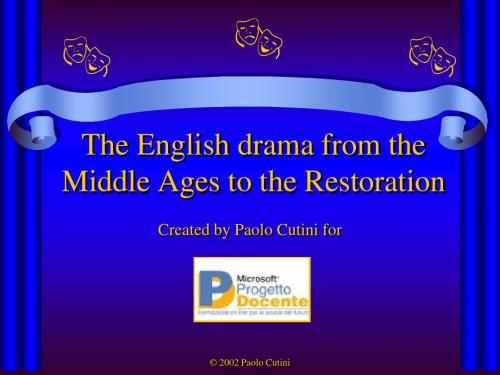
Elizabethan drama Authors and works
C. Marlowe (1564-1593)
- Tamburlane the Great - Doctor Faustus - The Jew of Malta
B. Jonson (1572-1637)
- Volpone - Bartholomew Fair
Elizabethan drama General features
Drama became the national literary manifestation of the time: the theatres were open to everybody Moralities and interludes were still a living memory, since they had instilled a great interest in drama in the people
Medieval drama Themes
Mystery plays usually dealt with Gospel events: their main subject was the redemption of man Miracle Plays were concerned with episodes from the lives of saints Moralities too were religious plays, but they focused on the conflict between good and evil; their aim was to improve people’s moral behaviour
Medieval drama Authors and works
English Drama英语戏剧写作及表演技巧
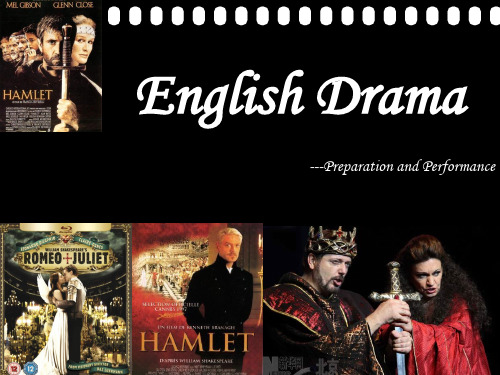
>>
0
>>
1
>>
2
>>
3
>>
4
>>
Activity 1: You jump, I jump!
>>
0
>>
1
>>
2
>>
3
>>
4
>>
You jump, I jump!
• Leader version:
– I want to jump, and all of you must jump after me.
>> 0 >> 1 >> 2 >> 3 >> 4 >>
Actor FAQs
• • • • • • •
>>
What is an actor? What basic skills should I have as an actor? How do I get a part in a play? How do I learn the part? Rehearsal Performance After performance
English Drama
---Preparation and Performance
>>
0
>>
1
>>
2
>>
3
>>
4
>>
Why do we learn English Drama?
• • • • • • Language competence Confidence Comprehension Imagination Creativity Team work
有趣的英语戏剧课作文
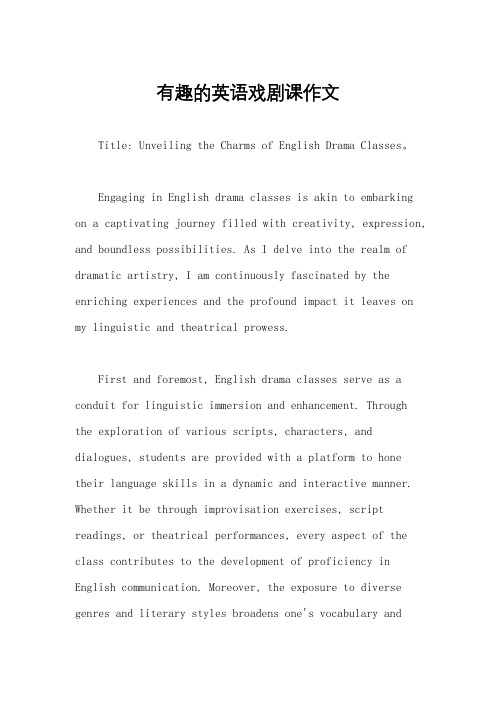
有趣的英语戏剧课作文Title: Unveiling the Charms of English Drama Classes。
Engaging in English drama classes is akin to embarking on a captivating journey filled with creativity, expression, and boundless possibilities. As I delve into the realm of dramatic artistry, I am continuously fascinated by the enriching experiences and the profound impact it leaves on my linguistic and theatrical prowess.First and foremost, English drama classes serve as a conduit for linguistic immersion and enhancement. Through the exploration of various scripts, characters, and dialogues, students are provided with a platform to hone their language skills in a dynamic and interactive manner. Whether it be through improvisation exercises, script readings, or theatrical performances, every aspect of the class contributes to the development of proficiency in English communication. Moreover, the exposure to diverse genres and literary styles broadens one's vocabulary andfosters a deeper understanding of the nuances of the English language.Furthermore, English drama classes foster creativity and imagination. Within the confines of the stage, students are encouraged to unleash their artistic flair and explore the depths of their creativity. From devising original scenes to interpreting classic works of literature, each task challenges students to think outside the box and push the boundaries of conventional expression. Thecollaborative nature of theatrical production also cultivates teamwork and cooperation, as students work together to bring their ideas to life on stage. Throughthis creative process, individuals not only discover their own unique voice but also learn to appreciate the diverse perspectives and talents of their peers.Additionally, English drama classes offer a platformfor self-expression and personal growth. The act of embodying different characters allows students to delveinto the intricacies of human emotions and experiences, fostering empathy and understanding. Whether portraying aShakespearean hero or a modern-day protagonist, each role provides an opportunity for introspection and self-discovery. Moreover, the confidence gained from performingin front of an audience instills a sense of self-assurance and resilience that transcends the boundaries of the stage. As students overcome stage fright and embrace the spotlight, they emerge from each class with a newfound sense of empowerment and self-assuredness.In conclusion, English drama classes serve as acatalyst for linguistic, creative, and personal development. Through a combination of language immersion, creative exploration, and self-expression, students are equippedwith the skills and confidence to navigate the complexities of the English language and the world at large. As I continue to immerse myself in the world of English drama, I am continually inspired by the transformative power of theatrical artistry and the endless possibilities it holds for personal and academic growth.。
英语戏剧比赛英文作文
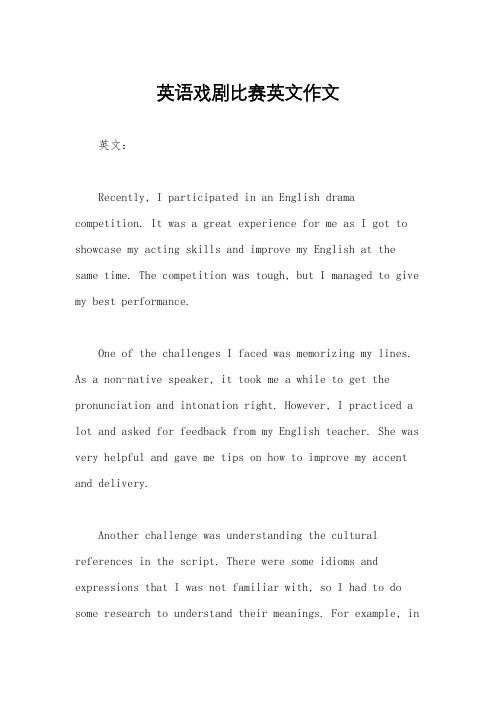
英语戏剧比赛英文作文英文:Recently, I participated in an English drama competition. It was a great experience for me as I got to showcase my acting skills and improve my English at the same time. The competition was tough, but I managed to give my best performance.One of the challenges I faced was memorizing my lines. As a non-native speaker, it took me a while to get the pronunciation and intonation right. However, I practiced a lot and asked for feedback from my English teacher. She was very helpful and gave me tips on how to improve my accent and delivery.Another challenge was understanding the cultural references in the script. There were some idioms and expressions that I was not familiar with, so I had to do some research to understand their meanings. For example, inone of the scenes, my character had to say "break a leg". I had no idea what it meant until my teacher explained it to me. It was a good learning experience for me as I got to expand my vocabulary and learn more about English culture.Overall, the competition was a great opportunity for me to improve my English skills and gain more confidence in speaking English. I also made some new friends who share the same passion for drama as me. I am looking forward to participating in more competitions in the future.中文:最近,我参加了一场英语戏剧比赛。
English Drama History01英国戏剧

Unlike Queen Quaeritis and its relevant section in the New Testament, Abraham and Isaac is a much extended dramatization of the original story in the Bible. Although the play does not deviate from the religious feeling and mood of its source, it is a charming presentation of a heart-touching story with well-drawn characters.
When Queen Elizabeth came to the English throne in 1558, English theater showed little sign of immediate and rapid growth. The old dramatic forms, Miracles, Moralities, and Interludes were still in existence, until almost the end of the 16th century. The arrival of the University Wits, and especially Christopher Marlowe can be regarded as a transition, from when the English theater began to feel the influence of classical drama.
2. Important Early Plays
英语话剧完整版带幕翻译
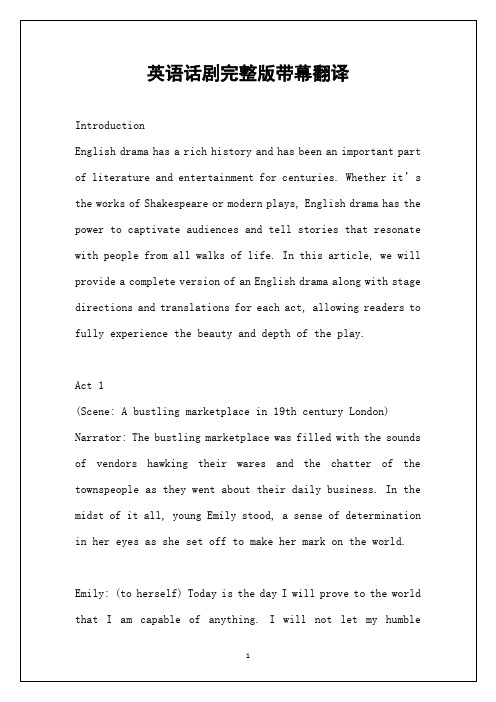
As Emily navigates her way through the crowded marketplace, she catches the eye of a wealthy merchant, Mr. Thompson.
Emily: (gratefully) Thank you, sir. I will not disappoint you.
As Emily curtsies and leaves the room, the scene shifts to the bustling marketplace once more.
Reluctantly, Emily is coaxed onto the dance floor, where she is soon twirling and laughing with the other guests.
Epilogue
Narrator: And so, Emily’s hard work and determination led her to find her place in the world. She proved that with perseverance and a willingness to learn, one can overcome any obstacle. As the music swirled around her, Emily knew that she had finally found her own happily ever after.
English+Drama+Writing+and+Performance+Skills
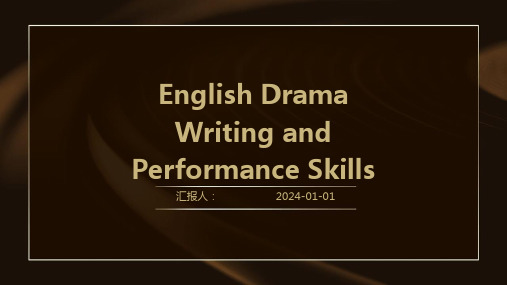
Writing and
Performance Skills
汇报人:
2024-01-01
CONTENTS 目录
• English Drama Writing Skills • English Drama Performance Skills • The Stage Arrangement and Prop
Plot concept
Plot Development
The ability to create a competing narrative that keeps the audience engaged through the play This involves introducing conflicts, developing subplots, and ensuring a satisfactory resolution
CHAPTER 02
English Drama Performance Skills
Promotion and integration
Accurate pronunciation and intonation
In English drama performances, accurate pronunciation and appropriate intonation are important means of conveying character emotions and story plot. Actors need to master the correct pronunciation of phonetic symbols and use different intonation in different situations to express the emotional changes of their characters.
English Drama History02英国戏剧史

Among Greene’s memorable plays should be
mentioned Friar Bacon and Friar Bungay (1589), The Scottish History of King James IV (1591), and probably also of his authorship A Pleasant Conceited Comedy of George a Greene, the Pinner of Wakefield (1588?).
As the title of this page suggests, they are known
collectively as the "University Wits," though they did not always work as a group, and indeed wrangled with each other at times. They were John Lyly, George Peele, Thomas Lodge, Robert Greene, Thomas Nashe, Christopher Marlowe and Thomas Kyd. Lyly and Peele and Lodge being from Oxford and Greene and Nashe and Marlowe from Cambridge while Kyd also likely to have received a university education. While Marlowe and Kyd were regarded as the innovators of Elizabethan tragedy, John Lyly and Robert Greene laid the foundation for the development of comedy of the age.
- 1、下载文档前请自行甄别文档内容的完整性,平台不提供额外的编辑、内容补充、找答案等附加服务。
- 2、"仅部分预览"的文档,不可在线预览部分如存在完整性等问题,可反馈申请退款(可完整预览的文档不适用该条件!)。
- 3、如文档侵犯您的权益,请联系客服反馈,我们会尽快为您处理(人工客服工作时间:9:00-18:30)。
The tragedy of Doctor Faustus is characteristic of a humanist in the age of Renaissance.
Blank verse (无韵诗):consists of lines of iambic pentameter (5 stressed iambic verse) which are unrhymed—hence the term “blank”. Of all English metrical forms it is closest to the natural rhythms of English speech, and at the same time flexible and adaptive to diverse levels of discourse; as a result it has been more frequently and variously used than any other type of versification. It was introduced into Britain by the Earl of Surrey (萨里爵士).
The Miracle Play: the „miracles” were simply plays based on Bible stories, such as the creation of the world, Noah and the flood, the birth of Christ. The Morality Play: a morality represented the conflict of good and evil with allegorical personages, such as Mercy, Peace, Hate and so on. The Interlude: a short performance slipped into a play to enliven the audience after a solemn scene. E.g.: “The Play of the Weather”
Hale Waihona Puke Drama in the Renaissance Period
The Classical Drama: contact with Greek and Latin drama. Comedy: “Gammer Gurton‟s Needle” (1562) ; tragedy: “Gorboduc” (1562) The above plays were the forms of drama prevailing until the reign of Elizabeth.
supreme desire of the man of the Renaissance for
infinite power and authority. It is noted for Marlowe’s mighty lines.
THE TRAGICAL HISTORY OF DOCTOR FAUSTUS
亚里士多德对悲剧的定义
“悲剧是对一个严肃、 完整、有一定长度的 行动的摹仿;它的媒 介是语言,具有各种 悦耳之音,分别在剧 中的各部分使用;摹 仿方式是借人物的动 作来表达,而不是采 用叙述法;借引起怜 悯与恐惧来使这种情 感得到陶冶”。
Drama in the Renaissance Period
Aristotle on Tragedy
“Tragedy, then, is an imitation of an action that is serious, complete, and of a certain magnitude; in language embellished with kind of artistic ornament, the several kinds being found in separate parts of the play; in the form of action, not of narrative; through pity and fear effecting the proper purgation of these emotions.” ----The Poetics Part VI
Christopher Marlowe (1564-1593)
Life --- the most gifted of the “university wits”; the son of a shoemaker in Canterbury, and went to London in 1584, and in 1587 he took the London theatre by storm with his first play Tamburlaine.
English Drama in the Renaissance Period
“University Wits” (Christopher Marlowe), William Shakespeare
What is Drama?
The word drama comes from the Greek verb dran, meaning “to perform.” When we speak drama, we mean a story in dialogue performed by actors, on a stage, before an audience--- in other words, a play. We also use the term drama in a more general sense to refer to the literary genre that encompasses all written plays and to the profession of writing, producing, and performing plays.
The Classifications of Drama
Tragedy: A type of drama in which the characters experience reversals of fortune, usu. for the worse. In tragedy catastrophe and suffering await many of the characters, esp. the hero. Comedy: A type of drama in which the characters experience reversals of fortune, usu. for the better. In comedy things work out happily in the end. Tragicomedy: a type of play that contains elements of both tragedy and comedy.
The Playwrights: University Wits
A group of men of letters who wrote for the stage of the 16th century, e.g., Lyly, Marlowe, Greene, etc, who were all of humble birth and struggled for a livelihood by writing . They entered the dramatic circle between the years 1587-93. They were hard workers, revising old plays and wrote new one; making rapid progress in dramatic technique, looked down upon by the gentlemen and suspected by the government. Among them, Christopher Marlowe was the most famous one.
TamburlaineThe great( first play)
A drama in a blank verse(无韵诗,素体诗)
Tamburlaine was a real person on the 14th century central Asia. He was a Mongol conqueror. A tragedy about a man who with high ambition and sheer brutal force thought he could but actually could not control his own fate. By depicting a great hero, the author voiced the
The definition further explained:
By „language embellished,‟ I mean language into which rhythm, „harmony‟ and song enter. By „the several kinds in separate parts,‟ I mean, that some parts are rendered through medium of verse alone, others again with the aid of song.”
Doctor Faustus (masterpiece)
It is based on the German legend and reshapes it freely.
